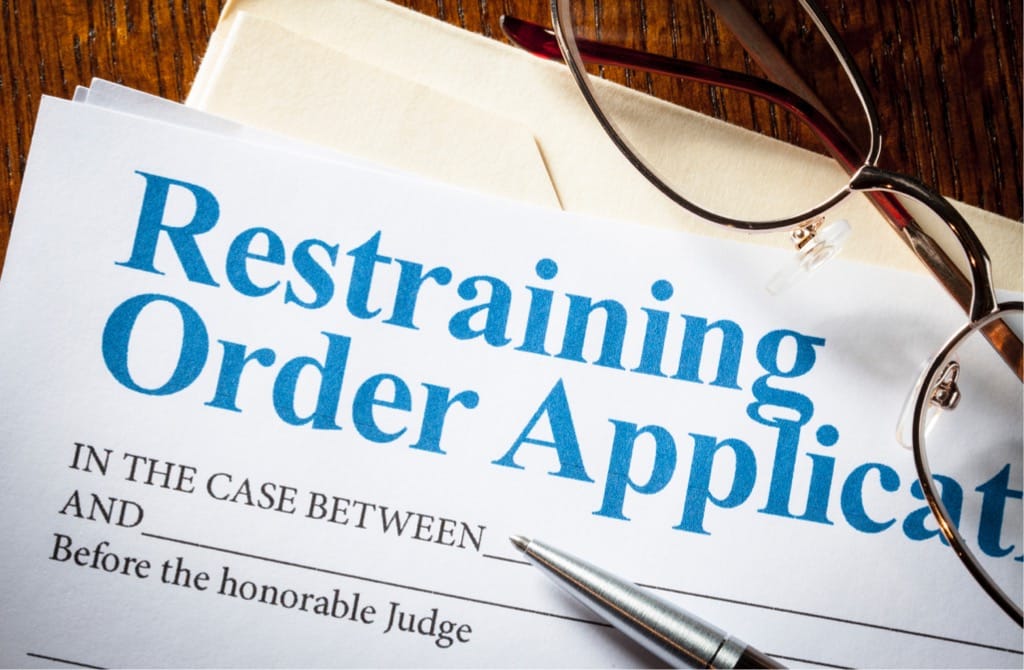Traffic violations are common on Kansas and Missouri roads. The National Highway Transportation Safety Administration…

What Happens if Someone Files a Restraining Order Against You in Missouri?
Victims of harassment and domestic violence in Missouri can petition the court for legal protection from their perpetrators. In extreme situations, the court can and should grant these requests. But, in other cases, restraining orders are nothing more than a means to intimidate or harass a person using the legal system.
So, what should you do if someone files a restraining order against you in Missouri? Since these items can have severe and lasting consequences, you should speak with a qualified attorney who can defend and protect your rights.
What is an Order of Protection?
An Order of Protection, also known as a restraining order, is a legal order issued by the Missouri state court requiring one person to stop harming another. In this state, these types of orders can be issued due to harassment, stalking, sexual assault, and domestic violence.
A Protective Order prohibits the Respondent from engaging in certain activities that involve the individual making the complaint. Those activities can include staying away, not contacting, not stalking or harassing, paying specific bills or prohibiting the sale of assets, and even some aspects of child custody or visitation.
There are two types of protective orders in Missouri:
Ex Parte
An Ex Parte Protective Order is simply an initial order of protection. The order is only based on the information provided by the complaining individual, so it is considered one-sided. These are short-term orders. According to state law, a hearing with both parties must be held within 15 days to upgrade the order or dismiss the ex parte order. There are some exceptions to this rule.
Full Order of Protection
A Full Order of Protection can only be put in place after a hearing that allows both parties to be heard and present evidence. This type of order usually lasts between 180 days to a year; however, in some instances, it can last up to 10 years and is renewable.
Potential Consequences of an Order of Protection
Having an Order of Protection against you can result in a variety of consequences that you’ll want to avoid:
Firearms Ban
Even though protection orders are dealt with in Missouri state courts, one of the consequences you can face comes from a federal law that prohibits a person from possessing a firearm or ammunition while having an active order.
Specifically, Title 18 U.S.C. § 922 restricts a person’s right to possess a firearm as soon as a full order of protection prohibits a person from threatening, stalking, or harassing an intimate partner or partner’s child. Violation of this statute is a federal offense punishable by a fine of up to $250,000 and/or ten years imprisonment.
Legal Consequences
There are other legal consequences if you violate an order of protection. While an order can be established in civil court, violating such an order becomes a criminal matter, according to Section 455.085 of the Revised Statutes of Missouri.
Violation of a Protection Order is considered a Class A misdemeanor. Penalties can include fines up to $2,000 and/or up to one year in jail. If you have been convicted of such a charge in the past, another violation becomes a Class E felony with enhanced penalties.
Personal Consequences
Orders of Protection in Missouri become part of the public record. This means that just about anyone, from potential employers to landlords to future romantic partners, can view this information about you for many years to come.
Having someone make allegations about your character is hurtful. But, what one of these cases can do to your future is even more damaging. If you have been served with an Order of Protection in Missouri, you owe it to yourself to fight for your good name.
What Happens at a Protection Order Hearing in Missouri?
When you attend an Order of Protection hearing in Missouri, you have the opportunity to share your side of the story and present compelling evidence that proves your innocence. The Petitioner has the burden of proof in these cases. Although, most people understand that a well-worded and emotional petition is good enough for most courts.
These cases are heard in the circuit court in the jurisdiction in which the petition was filed. Both sides have the opportunity to negotiate a successful resolution before the hearing. If no resolution is possible, the evidence is presented to the judge, who will make a decision.
What to Do If You’ve Been Served With an Order of Protection
If you’ve been served with an Order of Protection, it’s always in your best interests to defend your rights. Here are several things you’ll want to make a priority:
- Understand your responsibilities. Read the order carefully and avoid violating any of its terms. Make a note of the location, date, and time of the upcoming hearing so that you can attend to tell your side of the story.
- Avoid discussing your case. It can be tempting to line up allies. But, this is generally a mistake. Avoid posting your case on social media, sending texts or emails, or calling the person who filed the order against you.
- Contact your Guardian Ad Litem. If children are involved, find out if a Guardian Ad Litem has been appointed to your case and coordinate with them.
- Hire a seasoned Protection Order lawyer. It would be a mistake to represent yourself when the stakes are high. A qualified attorney can provide trusted counsel and guide your case to the most favorable resolution possible.
Contact an Experienced Missouri Protection Order Attorney
If you’ve been served with an Order of Protection in Missouri, it’s more than a piece of paper. Ignoring a hearing or violating one of these orders can have severe consequences. At Sloan Law Office, LLC, our legal team helps clients throughout the KC Metro Area respond to and defend against these allegations.
Our criminal defense attorney has successfully defended the rights and reputation of clients in Order of Protection hearings, and we will do the same for you. To schedule an initial consultation, call (816) 777-1340 or reach out to us online.




This Post Has 0 Comments